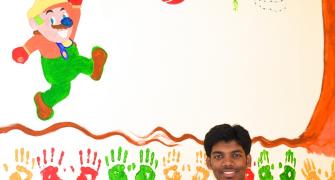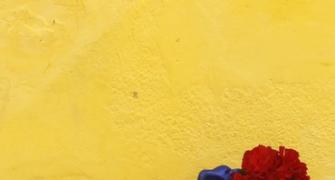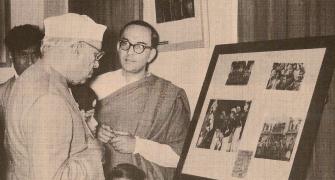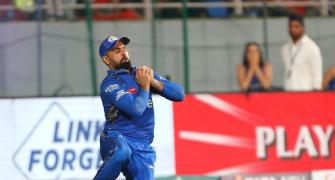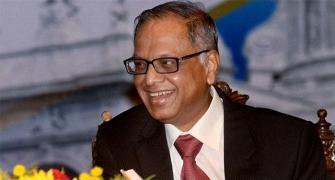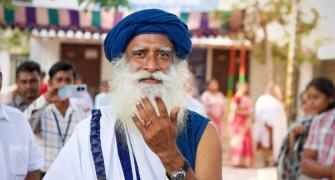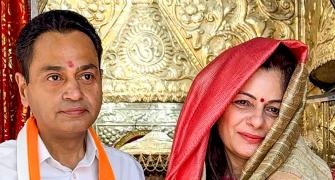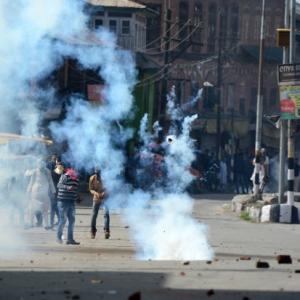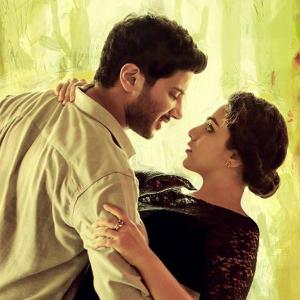Hemal Trivedi, a Hindu filmmaker originally from India, and Mohammed Ali Naqvi, a Muslim from Pakistan, made one of this year's most talked about films.
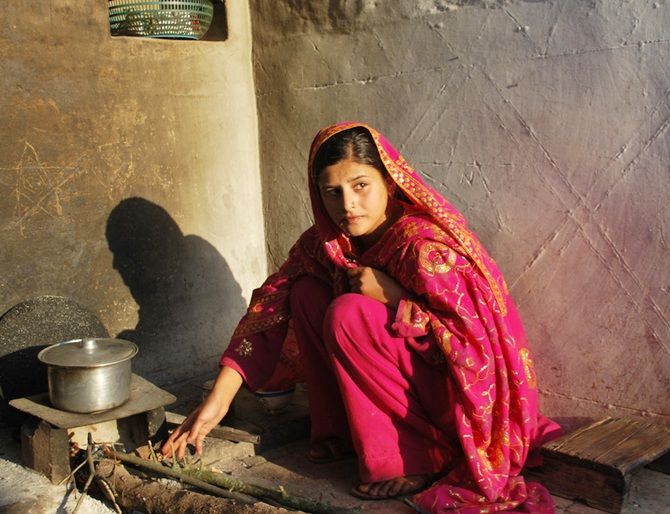
One of the most talked about films at this year's Tribeca Film Festival is the documentary Among the Believers. It was one of 20 films recommended by Time Out New York and it got a lot of attention.
What is fascinating about this film is that it is directed by Hemal Trivedi, a Hindu filmmaker who is originally from India, and Mohammed Ali Naqvi, a Muslim from Pakistan.
Together, the two weave the story about the Lal Masjid or the Red Mosque in Islamabad and the many madrassas it runs across Pakistan which have become the hotbed of radical Islam.
Among the Believers explores the roots of the growth of radical Islam in Pakistan; during the time of the Soviet invasion of Afghanistan and then follows the path until today.
In the process the film examines the lives and works of a number of people including Abdul Aziz Ghazi, the firebrand head cleric of the Red Mosque who is an ISIS and Taliban supporter; Dr Pervez Hoodbhoy, a moderate education activist who works at MIT; and two young Pakistanis -- Zarina, who escaped from a madrassa, and Talha who studies at one of the Red Mosque madrassas and is training to become a jihadi preacher.
Aseem Chhabra spoke to Hemal Trivedi and Mohammed Ali Naqvi, below, left, in Manhattan before the start of the Tribeca movie jamboree.
Hemal, Mohammed, do you both live in New York?
H: I live in New Jersey, but I spend about four months in Mumbai.
M: I live between New York and Karachi.
How did you both connect?
H: I wanted to make this film, well not in this form, but this idea came to me after the Mumbai terror attacks. I lost a dear friend in the attacks.
Until then there had been so many small attacks in India, but I never paid attention, because I was not a political person. But after the Mumbai attacks I was so shocked and I was so angry.
Also, I grew up in a Gujarati Brahmin family, hating Pakistan. I had so much anger in me that I tried to understand the politics of it. Then I went to Pakistan.
How did you go to Pakistan so easily? And what year it was?
H: It was in 2009 and I wanted to find out what was happening.
And you went as a filmmaker?
H: Yes as a filmmaker. I went there, I filmed at Zarina's school -- she is the girl in the film who escapes the madrassa. And then met Talha.
The first time I went to a madrassa I disguised myself as Henna Khan, and said I was a Pakistani from Dubai.
I was going to ask you this question. You are a Hindu. Hindus visit Pakistan and Pakistan also has Hindus. But for a woman and Hindu to enter a madrassa must have been a challenge.
H: I had an all-Pakistani crew.
And how did you get that set-up?
H: I networked. I made Pakistani friends. I met Pakistani journalists and through word of mouth I met Naziha Syed Ali, who is one of our co-producers. She was the first person I hired. And then I hired one more co-producer Syed Musharaf Shah. And then I went to the madrassa.
It seemed fine, but then I was tipped off that I was being watched by the ISI (Pakistan's Directorate of Inter Services Intelligence). And I was very scared. I didn't want to spend the rest of my life in a Pakistani prison. I also knew I needed someone to enter the lion's den -- the headquarters of the Red Mosque.
How much time had you spent in Pakistan?
H: About a month.
I knew I needed a man. So I talked to (Pakistani filmmaker) Mehreen Jabbar in New York and she introduced me to Mo. He was leaving for Karachi and was here for a day and I said let's just meet. I saw his work and his passion and knew we would work together.
Mo got the access to Abdul Aziz Ghazi, the head cleric of the Red Mosque.
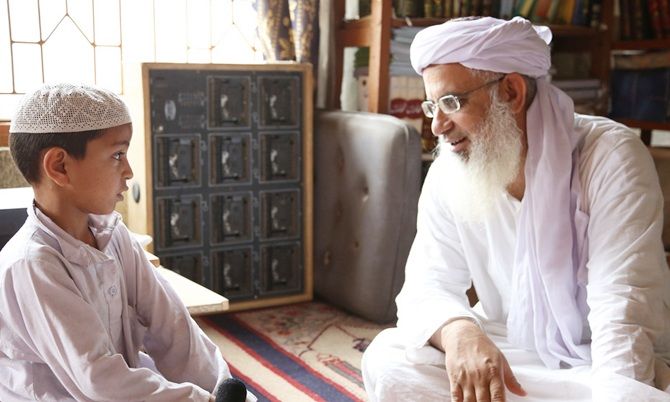
Did Aziz Ghazi (above, right) know what your politics were, where you were coming from? He seems very accessible.
M: I started working on the film in 2010. What you see in the film, that access wasn't granted to me instantly. I tend to work on feature documentaries for a while and when you work on a film for that long, you build your own relationships with your characters.
I grew up in Karachi and I am from the same neck of the woods as Aziz. So that certainly helped. But ideologically you cannot find anyone as poles apart from me.
I tried to be a blank canvas and used my characters to project whatever they wanted on me.
And Hemal was with you?
M: No, no, Hemal wasn't even in Pakistan at that time. I don't think she or Naziha would have been granted this access. They might have been allowed one interview and even then their lives could have been in danger. So it was Musharaf, our cameraman, and me.
I genuinely had questions about my own faith and spirituality. It was true. One thing I try and do when I make documentaries is to disassociate from any pre-judgments or biases I might be bringing into the situation.
I was excited about this project to begin with because liberal, progressive, Muslims are hardly represented in the media. And when Hemal came to me this opportunity excited me, because if there is a war of ideologies then it can be fought among the believers.
Was there a part of me that said 'Wait, she is from India, does she have another agenda?' There can be that unfortunate mistrust, but it was fine. We had a lot of arguments when we started the process.
What did you both argue about?
H: The biggest fight I had with Mo was that I saw things a little bit more black and white than he did. And Mo would say this is not that bad, and the other side is not that good.
I also didn't want this film to be polemic and most of the conversations we had were on that -- how to edit the story so it doesn't seem we are taking sides. We took a year-and-a-half to make the final edit.
Sometimes we would argue so much that we would not speak for two or three days. But it was interesting.
M: What I found interesting was that we talked about the same kind of problems happening in India as well, the extremists groups there.
But we also talked about that whether it is Maulavi Aziz or anyone else, it comes to economics. They are filling a need where the government and the State of Pakistan have failed. You can compare it to the mafia here back in the day, where they provided civil mechanism and institutions. They had parades and people liked them.
With Maulavi Aziz we were able to gain the trust. And like many dark characters he is a narcissist.
I found it very interesting that when the Red Mosque was raided, Aziz wore a burqua to escape. Do you remember when the police raided the Ram Lila grounds in Delhi and Baba Ramdev dressed up as a woman to escape?
Some people may see a lot of similarities between Ramdev's vision of society and that of Aziz.
M: The film was interesting to me because like Talha, I also attended religious classes -- not a madrassa, but a weekly class, where I did read the Quran. And I didn't know what I was reading.
It was the same in the sense that the clerics had a specific understanding of Islam that they tried to impose on the students. They would say to us 'Don't make friends outside your religion, don't wear shorts, support our martyrs fighting in Kashmir.'
H: But I learned that in India as well. My father would say don't have a Muslim boyfriend ever. You can have a Sikh boyfriend, but no BMW (blacks, Muslims and whites).
So when did Aziz really start to trust you guys?
H: In 2012 there was a talk show between Aziz and Parvez Hoodbhoy. After that he probably started to like us.
Hemal, has he met you by the way or does he know about you?
H: I have never met him, but he knows about me. Aziz saw all the clips that we were about to use and we had to do that to get his trust.
People sometimes ask me as a journalist if I can share with them what I am writing, and I don't do that.
H: I know, but we didn't want to take any risks. Aziz had warned us on camera. He said if you change the context in which I am talking and if you manipulate my words, then I will see you on judgment day.
But at all times he knew that you were going to show all perspectives and a Pakistan torn?
M: Yes, he knew about Parvez Hoodbhoy. But that was a litmus test for us. We obviously didn't want to make a film from one point of view. But it all comes down to individual perspectives, how people watch the film.
You have a Nobel Prize winner from Pakistan -- Malala Yousafzai -- and you don't even mention her name since the film is about education.
H: We kind of wanted to stick to the story. We haven't used anybody who is extraneous to our story.
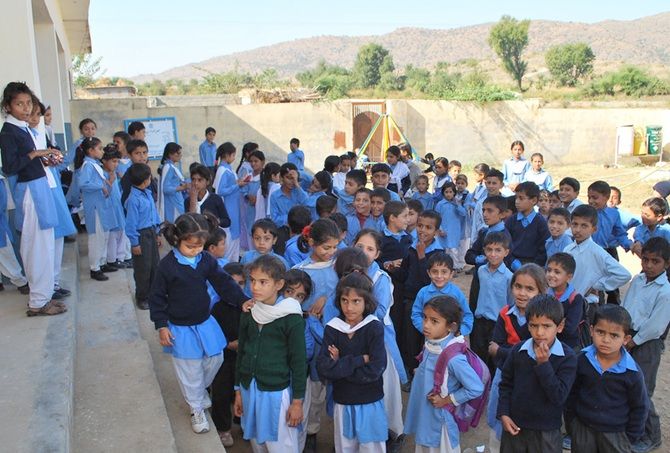
But she is the most recognised Pakistani outside Pakistan and she stands for what you want to show -- education of children and girls.
H: But we really saw her as a different story. If something doesn't fit the narrative, then it is not the same story. It was not intentional. We also kept out Greg Mortenson, the guy who wrote Three Cups of Tea.
We kept Osama Bin Laden's death out of the film, although it was a big thing for Aziz.
The saddest thing that happened in Pakistan was the killing of the students in Peshawar. It was a huge tragedy, but for your film that became an important endnote.
H: When we applied to Sundance -- and we weren't accepted -- at that time we didn't have a proper ending. When it happened and we got it as we captured the developments in front of us.
This film is important for the West and I am sure you can take it to India. But how about showing it in Pakistan?
M: Showing it in Pakistan is most important and I hope it happens since a lot of my films have been banned there. My film Shame on Mukhtaran Mai was banned. But I don't think this will be banned since we have made it quite even handedly.
So Hemal for someone who hated Pakistanis, what has this film taught you?
H: I didn't hate all Pakistanis. I hated those who carried out the attacks in Mumbai.
I really felt Pakistan was just like India. When I was out on the streets of Pakistan I felt I was in a Muslim neighbourhood in India. I wasn't scared anywhere on the streets.
I was in Rawalpindi with Musharaf at a lassi stand, and sometimes I slip into my Bombay Hindi. The guy there asked if I was from India. When I said yes, he said so you are my guest and gave me free lassi.
I was only scared in the madrassas, but so were Naziha and Musharaf. They had warned me not to speak or else my accent would give me away.
M: Even I was scared in the madrassas.
Mo, what did you learn from the film, as a Pakistani about what is happening to your country?
M: When I was growing up, I sort of compartmentalised my reactions to religion. I sort of rebelled against and didn't think of it as a big part of my identity until 9/11 happened. And then suddenly I realised that I am a Muslim male in New York.
I think in an odd manner this film was a way for me to revisit my spirituality, something I had pushed away for a long time. I did get to interact with people who were religious, but some of them were frothing at their mouths about doing jihad.
Fundamentally, this is an ideological battle that can be only fought and won amongst Muslims.
I know the theme of our film -- books not bombs -- may sound like a cliche, but it is true. It is not like you can change anyone's ideology. the best you can do is to hope people will grow within this environment.
Photographs, courtesy Among the Believers.

